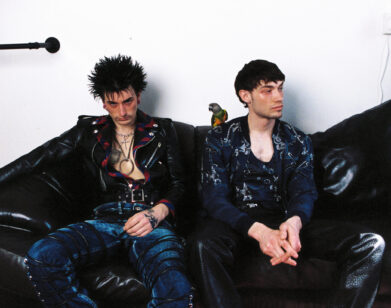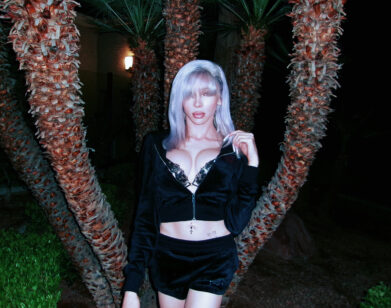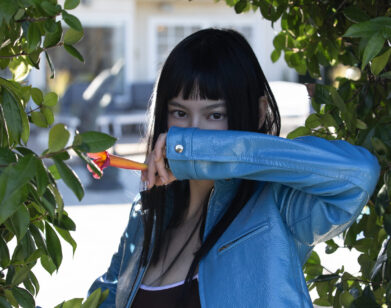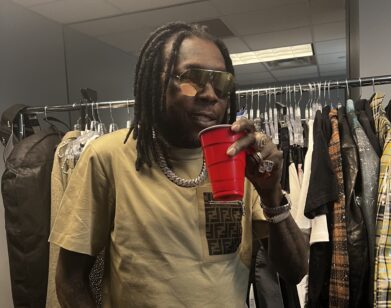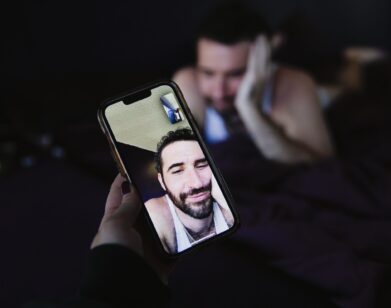The Riot Act
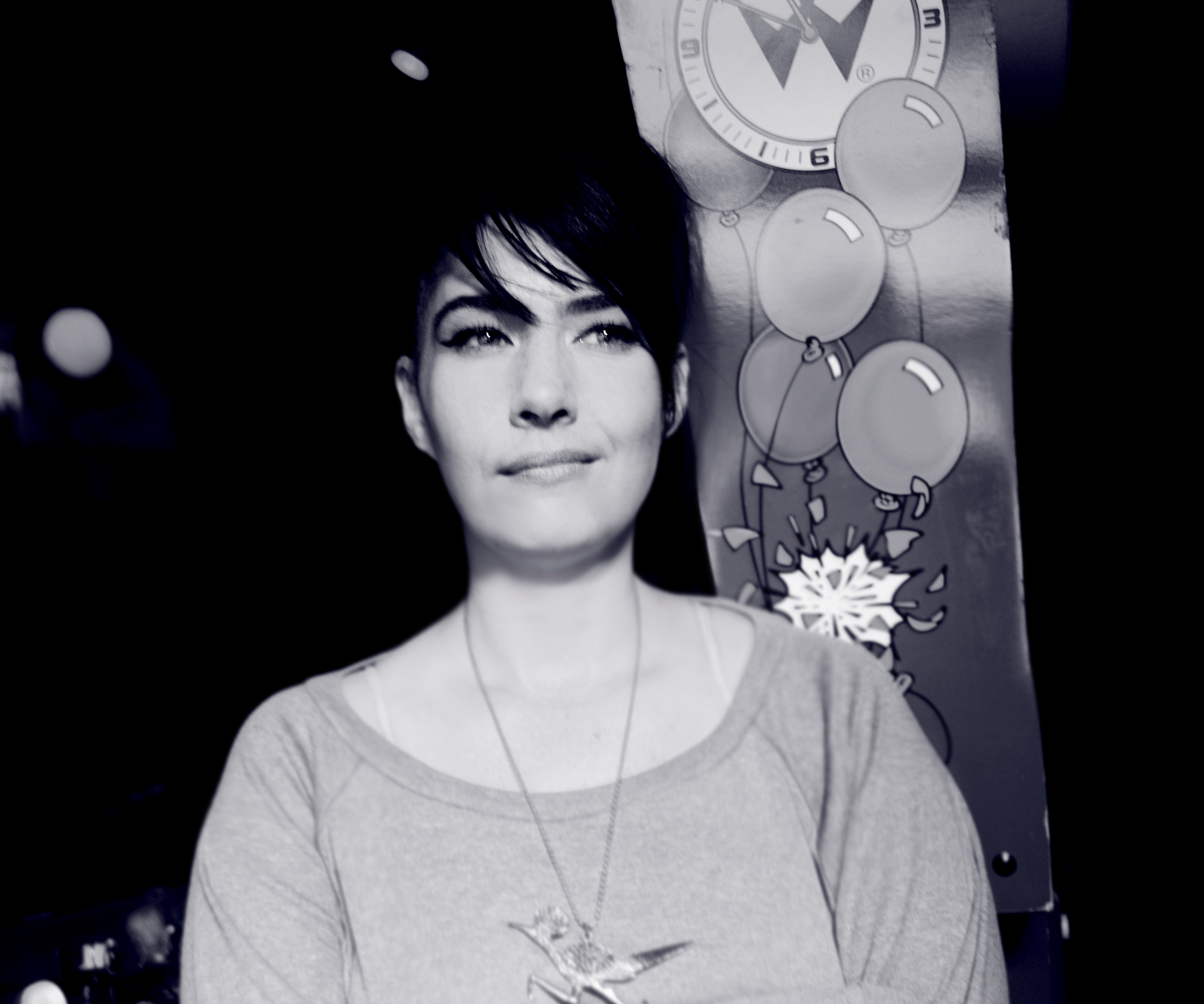
ABOVE: KATHLEEN HANNA. PHOTO COURTESY OF SHERVIN LAINEZ.
When riot grrrl heroine Kathleen Hanna starts a new project, it’s best to take note. In the ’90s, Hanna and her band Bikini Kill sparked a subculture of punk feminists. In the 2000s, her band Le Tigre covered the Pointer Sisters and brought back the spirited electro dance-pop of the ’80s. This week, the 44-year-old Hanna and her latest band, the Julie Ruin—named after a 1997 solo project—are releasing their debut album, Run Fast (TJR Records). Hanna assures us that in the 2020s, she’ll have a one-woman show.
EMMA BROWN: In the past you’ve said that you started playing music as a way of talking about an organization that you worked for, because no one listens to spoken word, but they do listen to music. Why do you make music now?
KATHLEEN HANNA: Well, I’m definitely not trying to advertise that specific organization anymore, though I still do have a relationship with them. Part of it for me is I’ve had some health issues over the past year and I needed something to look forward to. I realized that it’s what I love doing more than anything. It’s not like somewhere along the way I decided to be a total formalist in terms of music and to not care about content; the content is going to be there whether I try to make it be there or not, and I can have fun and see what happens. When I got sick I wanted to give myself that present—not be all about trying to bring people to feminism or trying to bring people to a specific organization.
BROWN: Do you consume music differently as well?
HANNA: Yeah. I’m much more into going to see live cabaret music and comedy mixed with music. I’ve always talked a lot on stage—I really wanted to communicate my ideas and when you’re playing at a lot of shitty punk clubs they don’t have good PAs and so no one knows what you’re singing about. I would talk a lot in between songs—”Oh, this is about domestic violence,” or, “This is about being in love with somebody”—and people in the indie rock world and in the underground punk world were really pissed off about the combination of talking and music.
BROWN: Really?
HANNA: They just want you to shut up and play. More than being called a “bitch” or a “feminazi,” I was just told to shut up and play. I think that was the most common mean thing that men yelled at me. I don’t think I’ve ever had a woman yell that at me, but women have yelled mean things at me as well. I think that it’s so powerful for me to go see someone like Bridget Everett at Joe’s Pub and watch her weave her songs in and out of these funny, tragic stories—you can talk and sing and it’s not this horrible offense, you’re going to get thrown in artistic jail.
BROWN: What made you return to the name Julie Ruin?
HANNA: I’d always wanted to perform this stuff live and I was never able to do it, and I finally found the right people to perform that record live. What usually happens with me [is that] I start with one idea in mind and then something else happens. We learned the whole record—the whole first Julie Ruin record—and then we just wrote another one. So now there’s a Julie Ruin record and there’s The Julie Ruin record. We just made it The Julie Ruin to specify that it’s a band because it’s totally collaborative. But we’re using [the original] record as our inspiration.
BROWN: You’ve mentioned your approach to the Julie Ruin is a little more relaxed.
HANNA: Every band I’ve been in, it’s just become my total life. I feel like a child star—I’ve missed out on so much. I never got to play Grand Theft Auto and get stoned every day. I figure at 45 I should probably start doing that.
BROWN: What would you be like as a teenager today?
HANNA: I probably would be way too overexposed on the Internet—Anthony Weiner, basically. I would have a blog with pictures of me naked and would be overly vulnerable, writing a bunch of stupid shit that I could never take back. I would have been trying to win The Voice or America’s Got Talent starting at a young age.
BROWN: What would be your audition song for The Voice?
HANNA: Back in the ’80s, “Maybe” from the hit Broadway musical Annie. Now, I would probably sing a Wilco song, but in a Christina Aguilera way. I’ve clearly already thought about this.
BROWN: You could be in Annie now and fulfill your childhood dream.
HANNA: I’m probably too old to play the secretary in Annie, which is depressing. I wouldn’t want to play Miss Hannigan. I’m not a villain. She’s mean to little children! I can’t do that. That would disrupt my brand.
BROWN: What was the most significant age for you?
HANNA: For whatever reason I just remembered being six years old and my parents leaving the house and trusting me to be alone. I had an older sister, I think she was supposed to babysit me but she immediately ran across the street to her friend’s house. It was the first time I was totally alone and I beelined to my room and put on my Christmas outfit—long dress, white vinyl boots—[and] put my hair in really long pigtails. I stood in the bay window at our house and I sang Away In A Manger. It was my first time on stage, but there was nobody watching. I just remember it was so natural and it was such a secret—like masturbating. I felt like I had to wait until everybody was gone. So I guess six years old would be my most important age, ‘cause in that moment, I just knew what I wanted to do. [laughs]
BROWN: Bikini Kill and Le Tigre were both very successful. Is it difficult when people focus on your earlier work?
HANNA: Talk to me like I died in the ’90s? It makes my stomach churn a little bit because the ’90s are so far away from me. But kids are just discovering stuff right now. I can’t fault them for that. I was super obsessed with the ’60s in the ’80s.
BROWN: Is it strange seeing people ironically dressed as if it’s 1995?
HANNA: We’re doing this song off the first Julie Ruin [1993] record called “V.G.I.,” which stands for Valley Girl Intelligentsia, because everybody made fun of my Valley Girl accent and treated me like I couldn’t be smart. One of the lines is, “I’m a masterpiece, I’m a philosopher, I wear a scrunchie.” In the ’90s, people wore scrunchies, but it was very uncool in the punk scene. Part of what I was trying to talk about—what Bikini Kill was trying to talk about—was that, while we were doing feminism within the punk scene, feminism was for all different kinds of women, and that the punk scene needed to reach outside of its boundaries. Recently, I went to American Apparel and they were selling ironic scrunchies: ugly, floral-print fucking scrunchies. But I’m singing about a real scrunchie.
RUN FAST IS OUT NOW.

